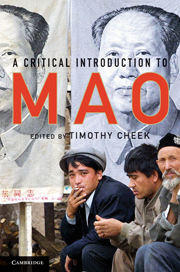Book contents
- Frontmatter
- Contents
- List of Illustrations
- About the Contributors
- Preface
- Acknowledgments
- Timeline of Twentieth-Century China
- Maps
- Part I Mao's World
- Part II Mao's Legacy
- 10 For Truly Great Men, Look to This Age Alone: Was Mao Zedong a New Emperor?
- 11 Recent Mao Zedong Scholarship in China
- 12 Third World Maoism
- 13 Mao's Journeys to the West: Meanings Made of Mao
- 14 Two Perspectives on Mao Zedong
- Appendix: Selected Further Readings (Annotated)
- Index
- References
14 - Two Perspectives on Mao Zedong
Published online by Cambridge University Press: 05 August 2012
- Frontmatter
- Contents
- List of Illustrations
- About the Contributors
- Preface
- Acknowledgments
- Timeline of Twentieth-Century China
- Maps
- Part I Mao's World
- Part II Mao's Legacy
- 10 For Truly Great Men, Look to This Age Alone: Was Mao Zedong a New Emperor?
- 11 Recent Mao Zedong Scholarship in China
- 12 Third World Maoism
- 13 Mao's Journeys to the West: Meanings Made of Mao
- 14 Two Perspectives on Mao Zedong
- Appendix: Selected Further Readings (Annotated)
- Index
- References
Summary
We close this critical introduction with two reflections on the entirety of Mao's life – one from a senior Chinese scholar and one from a senior Western scholar. Professor Jiang Yihua is a distinguished scholar of modern Chinese history at Fudan University, Shanghai. His research on Mao is extensive, as is his broader historical work. In addition, he lived through much of Mao's rule and now works and writes under the rule of Mao's successors in China. Professor Roderick MacFarquhar has resolutely made history part of the study of Chinese politics, from his work as founding editor of The China Quarterly, to his monumental trilogy, The Origins of the Cultural Revolution. As Professor in the Department of Government and leading force in the Fairbank Center for East Asian Research at Harvard University, MacFarquhar has shaped our views of Chinese politics under Mao.
Perspective 1: On Mao Zedong
There is an ancient Chinese saying that runs “Seal the coffin, offer a verdict,” meaning “final judgment” or to draw a final conclusion. But this sentence cannot be used to describe Mao Zedong, even though he is dead and buried. In fact, I fear we will not be able to draw any final conclusions on him for a long time.
Drawing final conclusions on Mao Zedong will be a long, involved historical process because distinguishing between the imagined Mao and the real Mao is something that cannot be achieved in a day.
- Type
- Chapter
- Information
- A Critical Introduction to Mao , pp. 332 - 352Publisher: Cambridge University PressPrint publication year: 2010

